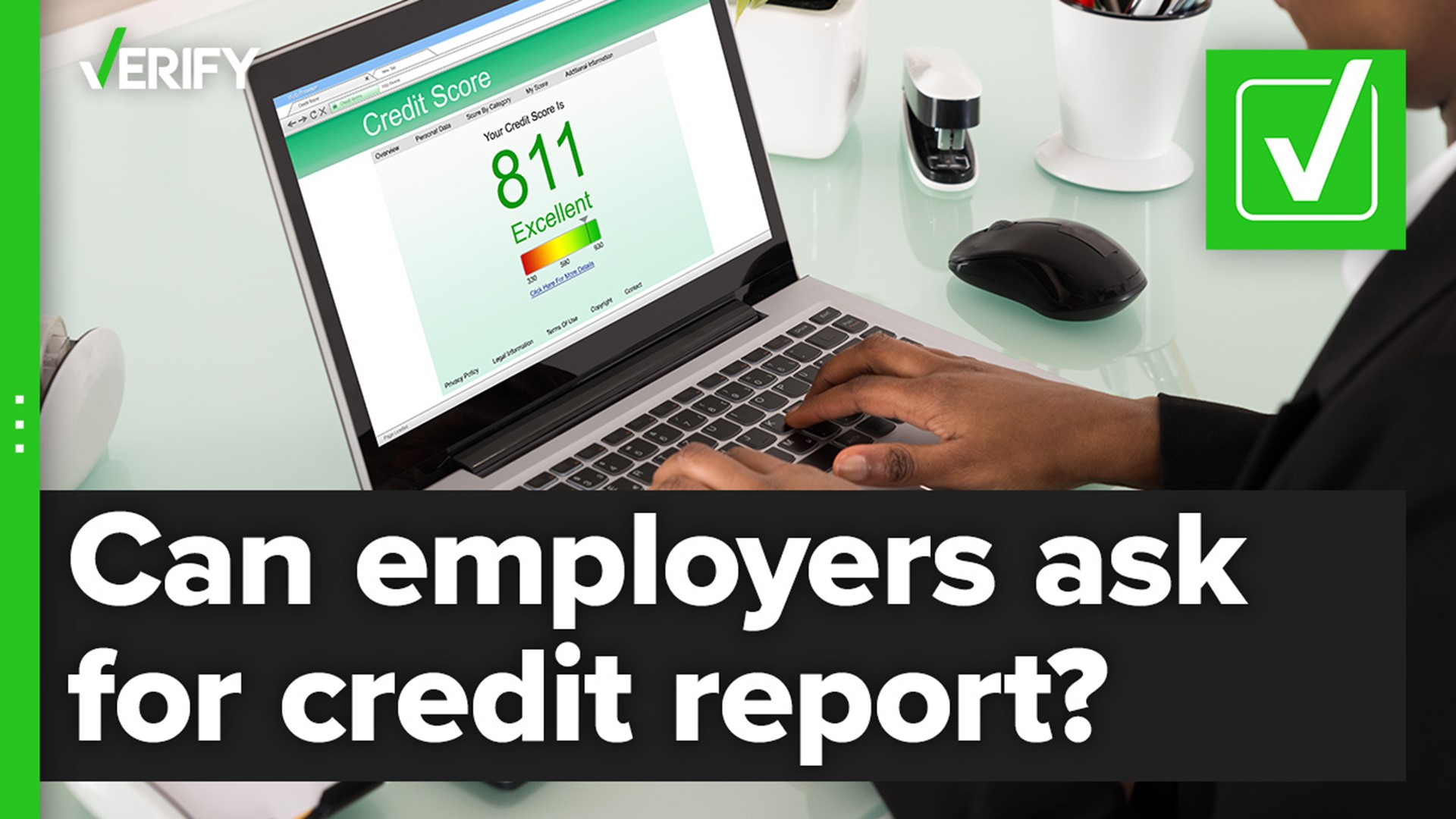The pandemic, layoffs and other changes to the labor market have forced many people to apply to new jobs in the past few years.
One VERIFY viewer who was going through the hiring process said a potential employer asked to look at her credit. She asked us if that's legal.
THE QUESTION
Can employers in most states request access to your credit report?
THE SOURCES
- The Fair Credit Reporting Act
- Equal Employment Opportunity Commission (EEOC)
- LendingTree, a loan-lending company
- National Conference of State Legislatures (NCSL)
- IntelliCorp, a company that provides employee background checks for businesses
- Experian, one of the three nationwide credit reporting bureaus
- David Cathey, a partner at financial recruiting firm Unity Search
- Di Ann Sanchez, Ph.D., who runs human resources consulting firm DAS HR Consulting, LLC
THE ANSWER
Yes, in most states, employers can ask for your permission to access your credit report.
WHAT WE FOUND
There is no federal law prohibiting employers from running a credit check, and it’s legal in most states. Still, federal law requires employers follow specific rules before they can see a person’s credit report, including getting their permission.
At least a dozen states and cities ban employers from requesting credit reports altogether, with a few exceptions for some employers — usually those in the finance industry and government.
Experts say overall, the practice is relatively rare and is typically used for positions in finance and money management.
The Fair Credit Reporting Act requires employers to ask for your written permission before they can check your credit. You can deny the request, but the employer can choose to not hire or promote you as a result.
If the employer chooses to not hire you because of something they saw in your credit report, they can’t reject you right away. Before they can do that, they must:
- Notify you that they intend to reject you because of something in your credit report
- Include a full copy of your credit report, a summary of your rights from the Federal Trade Commission (FTC) and contact information for the company that provided them the report
- Give you an opportunity to correct any potential mistakes or errors on your credit report, or to provide context for any negative details in your credit report
- Provide an oral or written explanation of their final decision to reject you
Employers must also be wary of anti-discrimination laws when running credit checks, the Equal Employment Opportunity Commission (EEOC) says. So an employer can’t set different credit requirements for different groups of people applying for the same job, and they can’t have credit requirements that specifically disadvantage certain groups of people.
The National Conference of State Legislatures (NCSL) and IntelliCorp, a company that provides employee background checks for businesses, say at least 11 states and four major cities have laws limiting or banning employer credit checks. They are:
- California
- Chicago
- Colorado
- Connecticut
- Delaware
- Hawaii
- Illinois
- Maryland
- Nevada
- New York City
- Oregon
- Philadelphia
- Vermont
- Washington state
- Washington, D.C.
For more information on your own state’s laws regarding employer credit checks, consult your state’s office of labor.
So in instances where it’s legal to do so, what information do employers receive when they request a credit report?
According to Experian, one of the three major credit reporting bureaus, an employer will receive a credit report with:
- Personal information to verify your identity (with the exception of your birth date)
- Your Social Security number
- Details about the debts you’ve incurred (including mortgages, student loans and credit card debt)
- Your payment history of those debts (including if any are in collections)
Experian says the credit report will leave out:
- Your credit score
- Specific account numbers
- Information about your spouse
Typically, an employer running a credit check is doing so because they want to learn about your trustworthiness and aptitude for managing money, Experian says. LendingTree, a loan-lending company, says a credit check can also help an employer verify your identity or confirm your previous employment and experience.
David Cathey, a partner at financial recruiting firm Unity Search, said that he estimates employers ask to run a credit check on less than 10% of potential hires, and maybe even on less than 5%.
“A lot of times people think, ‘Oh, that’s dealing with money, so I bet you do it a lot.’ And it’s relatively rare,” Cathey said. “Where we do see that is if it's in a position where people are actually handling cash. So maybe it's in a cash management role, maybe it's in a treasury role. Maybe they're handling petty cash or a lockbox. We will see that occur in those situations.”
Di Ann Sanchez, Ph.D., who runs human resources consulting firm DAS HR Consulting, LLC, says she advises employers not to ask for credit checks unless it applies to the job the employee is applying for or already has.
“If it's not part of their job, then it's something they shouldn't be asking for,” Sanchez said.

